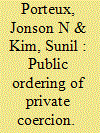| Srl | Item |
| 1 |
ID:
189556


|
|
|
|
|
| Summary/Abstract |
This study explores the origins of pervasive elderly poverty in South Korea, which persists despite the continuous expansion of welfare programs and the consolidation of popular democracy in the country. Predicated upon the historical-institutional details of the development of welfare programs, this article examines and elucidates how the instrumentalization of welfare policy-making since the onset of state-led industrialization and the progress of electoral democracy since the democratic transition have hindered the implementation of effective anti-poverty policies. It argues that the exponential politicization of welfare issues amid the demise of the agenda-setting and implementation capacity of the welfare bureaucracy has resulted in a political preference for low-benefit, quasi-universal solutions without an increase in taxes or contributions, which has crowded out the policy option of imposing sufficiently generous measures targeted at this vulnerable segment of society. As pervasive elderly poverty persists, old-age welfare has been substantially privatized and dualized, compelling seniors to find market-based alternatives or to work in low-paying precarious labour sectors. Consequently, trust in South Korea’s public welfare system has declined, impeding the formation of pro-welfare solidarity despite the overall growth of the universalist welfare system and popular democracy.
|
|
|
|
|
|
|
|
|
|
|
|
|
|
|
|
| 2 |
ID:
148520


|
|
|
|
|
| Summary/Abstract |
This study explores collaboration between state actors and non-state specialists in the market for coercion. We focus on the case of forced evictions in South Korea, where violence carried out by private companies has occurred with the implicit, and at times explicit, sanctioning of the state. This level of government–private security cooperation has traditionally been explained by various hypotheses, including arguments about the weak capacity of a state to enforce compliance, trends in the neo-liberal marketization of state power, or as the outcome of a state being captured by the capitalist classes. Documenting the history of urban redevelopment projects and changes in government responses to major protest incidents in Korea, we instead argue that this niche market for private force is an observable implication of a shift in state–society relations in the wake of democratization. This phenomenon is, in effect, a very undemocratic response to democratization, by state elites.
|
|
|
|
|
|
|
|
|
|
|
|
|
|
|
|